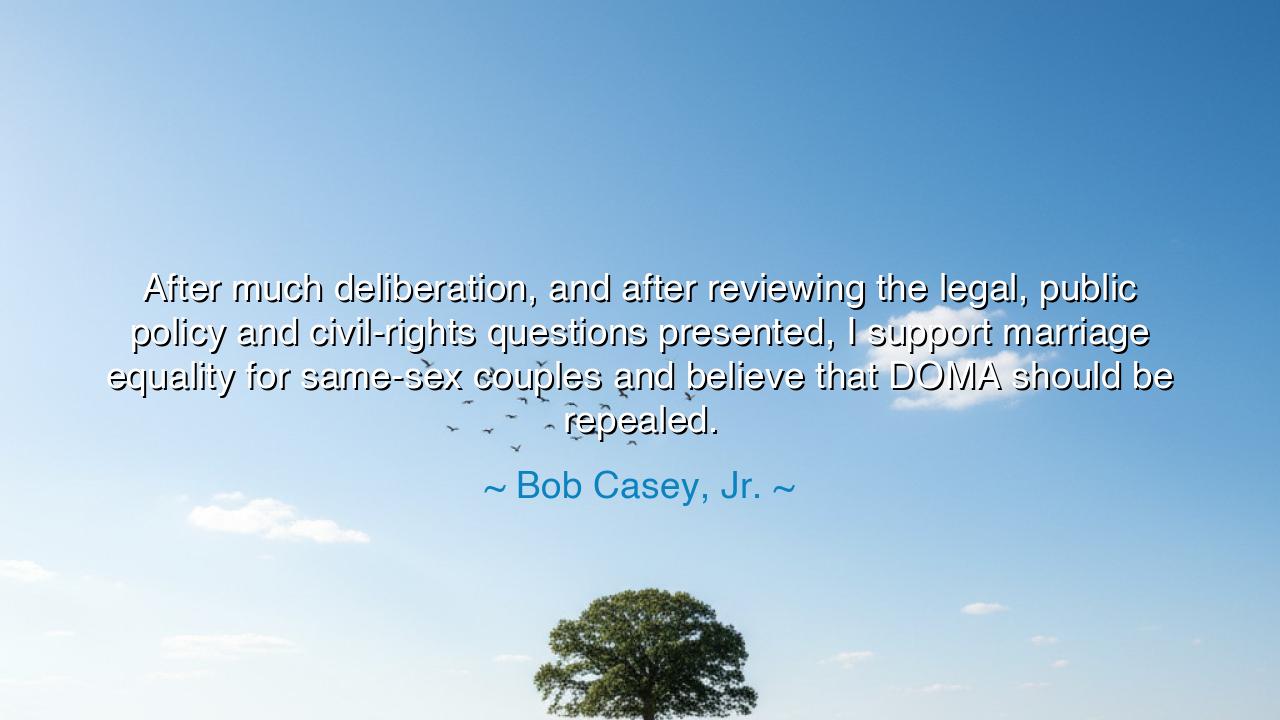
After much deliberation, and after reviewing the legal, public
After much deliberation, and after reviewing the legal, public policy and civil-rights questions presented, I support marriage equality for same-sex couples and believe that DOMA should be repealed.






In the solemn and resolute words of Bob Casey, Jr., there resounds the echo of a moral awakening: “After much deliberation, and after reviewing the legal, public policy and civil-rights questions presented, I support marriage equality for same-sex couples and believe that DOMA should be repealed.” These words, spoken not in haste but after long reflection, mark a turning point in both personal conscience and public justice. They reveal the journey of a man who, guided by both faith and fairness, came to see that equality cannot exist in part—it must exist in whole. In this declaration, Casey joins the lineage of those who, through careful thought and moral courage, have chosen to stand on the side of human dignity rather than tradition’s comfort.
The meaning of this quote reaches beyond law and politics; it touches the soul of civilization itself. When Casey declares his support for marriage equality, he is not merely endorsing a policy but affirming the ancient truth that love, when genuine, is sacred in all its forms. His words are an acknowledgment that justice cannot be bound by prejudice nor compassion limited by fear. By calling for the repeal of DOMA—the Defense of Marriage Act, which denied federal recognition to same-sex unions—he rejects the notion that equality can be selective. In his voice we hear the awakening of a nation’s conscience, a recognition that love and liberty must walk hand in hand, or neither can endure.
The origin of this statement lies in a time of great moral struggle within the United States. For generations, laws had divided families and hearts, exalting some unions while condemning others. The Defense of Marriage Act, passed in 1996, was born from fear—the fear of change, of diversity, of love unrecognized by old institutions. But as the twenty-first century dawned, the tide began to turn. Stories of courage and devotion—of couples who endured rejection, of parents who longed for their children’s equality—began to melt the hardened walls of prejudice. In this climate of transformation, leaders like Bob Casey, Jr., who had once stood cautiously apart, found the courage to join the march toward justice. His statement was not merely political—it was an act of reconciliation between law and love.
Consider the story of Edie Windsor, whose quiet defiance helped bring down DOMA itself. When her beloved partner, Thea Spyer, passed away, Windsor was denied the spousal exemption from estate taxes—an indignity inflicted simply because her marriage was between two women. Yet, rather than succumb to bitterness, she fought with dignity and truth. Her case reached the Supreme Court, and in United States v. Windsor (2013), DOMA was struck down as unconstitutional. Her victory was not hers alone—it was a triumph for countless hearts long denied recognition. And it was in this rising dawn of justice that Bob Casey’s words found their home. His statement became part of the great chorus that affirmed what Windsor had proven: that love is law’s highest teacher.
But Casey’s words also reveal something more subtle—the humility of moral evolution. He speaks “after much deliberation,” acknowledging that understanding often comes slowly. True wisdom, he reminds us, is not the stubborn certainty of those who refuse to grow, but the courageous self-examination of one who dares to change. His journey mirrors the inner journey that society itself must take—from ignorance to awareness, from tolerance to full acceptance. Progress does not always begin with passion; sometimes it begins with reflection, the quiet work of conscience.
His declaration is a testament to the power of empathy in governance. The laws of nations must not merely preserve order—they must protect the dignity of the human spirit. Casey’s words call us to remember that democracy is not only about majority rule, but about justice for the marginalized. He stands as an example of leadership that listens, learns, and acts upon the moral call to equality. In an age when political courage often falters before convenience, his transformation is a reminder that integrity is born when compassion overcomes fear.
Therefore, O listener, take this lesson into your heart: justice is not a static ideal but a living flame, one that must be rekindled with every generation. Question what you have been taught; weigh your beliefs not by tradition alone, but by truth and kindness. Do not wait for the world to change before you do—change begins within. When you see another denied their humanity, speak as Bob Casey, Jr. did, not for applause but for conscience.
And so remember the enduring wisdom of Bob Casey, Jr.: that progress is not made through the shouts of the self-righteous but through the quiet courage of those who think, reflect, and then act in the service of love. The repeal of DOMA was not merely a legal victory; it was the turning of an age—the triumph of the heart over fear, of justice over division. When love is recognized as equal, humanity itself stands taller. And in that light, the society we build begins, at last, to reflect who we truly are.






AAdministratorAdministrator
Welcome, honored guests. Please leave a comment, we will respond soon